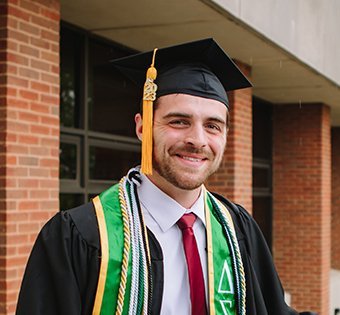
Next step: Ph.D. student in mathematics at Case Western Reserve University
Quinn Aiken arrived at Ohio Northern University four years ago with an interest in math, but with no concrete ideas for his future path. He graduated with impressive research credentials in partial differential equations and machine learning, with plans to obtain his Ph.D. at Case Western Reserve University.
“ONU’s academics really pulled through for me,” he says. “Research-wise it was great. It is hard to beat a small school where you get to work directly with Ph.D. professors.”
Aiken credits his AP Calculus teacher at Madison High School, Madison, Ohio, with identifying his aptitude for mathematics. “He pointed out that I really enjoyed the analytics of problem solving.”
At the time, Aiken says, “I didn’t even know that you could be a math major in college.”
At ONU, Aiken majored in mathematics with minors in physics and computer science. He initially planned to get his undergraduate degree and find a job in the banking industry. Then during his sophomore year, he decided to try his hand at research.
“It was as easy as going to my advisor and asking, ‘can I work with you?’” explained Aiken.
Joining forces with Dr. Anup Lamichhane, associate professor of mathematics, Aiken delved into research on partial differential equations. A previous ONU math major, who is now getting his Ph.D. at Ohio State University, had come up with a novel way to approximate these equations. Aiken and Dr. Lamichhane continued with this line of research.
Aiken’s research gave him the opportunity to present at mathematics conferences at the University of Dayton and the University of Toledo. It also made him a competitive candidate for a paid summer internship, called an REU (Research Experiences for Undergraduates), sponsored by the National Science Foundation. REUs are highly-competitive and only top-tier scholars get accepted.
For the summer between his junior and senior year, Aiken obtained an REU at North Carolina State University (NCSU) engaging in machine learning research.
“Machine learning is a hot topic nowadays,” says Aiken. He explained that the algorithms used to teach image recognition to machines will impact the technology of the future, including self-driving cars.
Machines learn differently than humans, he elaborated. A human, for example, can identify objects, such as a stop sign, even if it is rusted or partially obscured with leaves or mud. A machine, however, will often misidentify an altered stop sign.
“Machines learn weird things (to identify an object) that you and I don’t really pick up on. So, there is a whole field called adversarial machine learning algorithms, where algorithms are ‘attacked’ using images that have been tampered with, in order to get misclassification. It is a huge problem for the application of machine learning and, as one example, for companies that are trying to use image recognition for self-driving cars.”
Aiken worked on a small undergraduate research team alongside an NCSU professor and his graduate assistant exploring ways to use partial differential equations to make machine learning algorithms more robust.
“It was a really good program and I got to meet people from all over the U.S.,” said Aiken. “It set me up to do a lot of other exciting things in the future.” Thanks to his REU, Aiken had the opportunity to present his research in Boston in January 2023 at the Joint Mathematics Meetings, one of the largest mathematics gatherings in the world.
At ONU, Aiken also participated in several other enriching experiences. He played on ONU’s club Rugby team, he was a member of Klondike’s Crew every August helping to move in freshmen to the dorms, and he served on the Getty College of Arts & Sciences student advisory board, where he had to the chance to participate in the interview process for the college’s new dean.
After obtaining his Ph.D. from Case Western Reserve University, Aiken’s ultimate career goal is to work in the industry or for a governmental agency, like NASA.
Wherever he ends up, he’ll never forget the relationships he forged with classmates and professors and the doors that ONU opened for him. “I am going to miss the people the most,” he says. “I am so glad I came to ONU, because I’ve made friends for the rest of my life.”